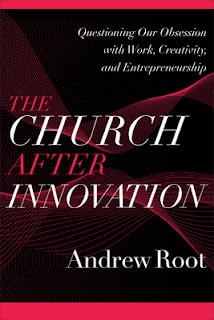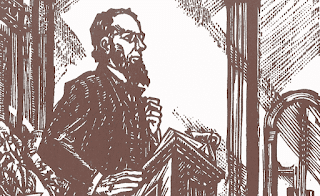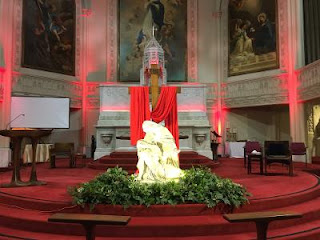Andrew Root is a Professor of Youth and Family Ministry, who has written several books on ministry in our secular age – most recently The Church After Innovation: Questioning Our Obsession with Work, Creativity and Enrtepreneurship (Grand Rapids: Baker, 2022).
Root starts with an account of a Lutheran synodal event at which he spoke. a previous speaker , whom he nicknames « Applebees Boy, » argued that the Church needs to be innovative and creative – or else die. » Root also meets « Synod Executive Guy, » a stereotypical church bureaucrat with the responsibility of disbursing money from the sale of closed churches. He, of course, favors investing in innovation. Later Root meets « Bearded Brown Turtleneck, » who represents the interests of more traditional pastors, who would like some of the money so they can maintain their existing institutions and continue their ministry. « A few of them could have really used a roof repair. But as they spoke, they didn’t justify their opposition in such self-serving ways. Rather, they talked of liturgy, creeds, and sacraments. Innovation was wrong because it wasn’t deep, because it ignored the tradition, because it was a fad, just a hipster spin on church growth. »
Not necessarily so opposed to all innovation as such, Root challenges his readers to dig deeper below the surface of the contemporary fad. He wants us to grapple with innovation and creativity’s connections with contemporary capitalism and with the inherent contradictions in late capitalism. Thus the early chapters focus on the historical evolution of work and our attitudes about work. In part this is a variation on the classic Weberian thesis about Protestantism, work, and capitalism (appropriately updated by Daniel Bell’s 1976 classic, The Cultural Contradictions of Capitalism).
In any case, whereas « once Protestantism and its commitments flowed directly into work, shaping work, now the ways we work in late modernity (driving toward permanent innovation) have come flowing back into the church, shaping what counts as ministry. »
Meanwhile, capitalism’s cultural contradictions combined with the unique experience of the Baby boom generation (a term I think Root rarely if ever employs, but which chronologically best identifies « the children of the 1950s and 1960s were creatures whose habitat was completely cordoned off from any self-denying work for the first time in history. They knew little to nothing of the childhood work on farms and factory floors from earlier American generations. This self-denying work was far removed from the experience and the imagination of the new American suburbs and the children. »)
But capitalism requires such a sense of duty. So the « new source of duty became the self. It seemed perfect. It felt like a freedom beyond the contradiction of capitalism for the worker. But it wasn’t. It was deeply expressive and bound within you. But it was still a duty. You were now accountable to the project of your own self. You owed it to your self to work hard and advance. »
Furthermore, for Root, it was Freud, whom he nicknames « the Viennese worm that exposes the true self, » who has taken « us down a road where the self becomes fundamentally our own project. »
Chapters 7 and 8 further develop the theme of the contradiction between contemporary capitalism’s culture of innovation and what the Church is ultimately supposed to be about. For one thing, « commitment and the neoliberal economy of permanent innovation don’t necessarily go together. Innovation produces engagement, but not necessarily long-term commitment. » Drawing on Andreas Reckwitz, who builds off Foucault, Root writes about what he calls « an expressive creativity dispositif, » in which – only in which – « in a dispositif that glorifies expressive creativity can disruption and insecurity (over routine and security) be embraced as a better way of being. » But the « cultural realities that accompany expressive creativity corrode the faith life of the Christian confession. They become problematic for faith formation. »
Chapter 9 returns to the period when money became so much more prominent. He recalls the story of Saint Francis, who « chose to be in the world naked with God, rather than follow the money. » He links the reforming movement sin the medieval (Catholic) Church with the galvanizing effect of money, while also becoming « the object or target of the reforming spirit itself. » Root regards the medieval Dominicans as especially interesting « for us as we seek to respond to singularity and recognize how innovation imposes an aesthetic of self-interest on workers. » Root focuses on Meister Eckhart whose « mystical path, even inside a moneyed world, became the way to keep the self from curving in on itself, stripping money of its divinizing dreams and therefore its ability to overcome our desires and to inhabit our minds. »
In chapter 10, « The Three Amigos of the Mystical Path, » Root proposes resources from the past: « three fourteenth-century companions who will assist us in combating the inflation of the self. Meister Eckhart, John Tauler, and the Mysterious Frankfurter all enter the mystical path for the sake of embracing the world and finding God squarely in it. » He then concludes, in chapter 11, with some more modern German figures – Friedrich Schelling, Georg Wilhelm Friedrich Hegel, and the poet Friedrich Hölderlin. Theirs was German Romanticism’s response to French Enlightenment empiricism.
Root concludes: « Perhaps in our secular age of authenticity and the drive for singularity, what the church needs isn’t innovators and entrepreneurs but poets who pray. We need more Eugene Petersons than Rick Warrens, more Kendrick Lamars than Mark Zuckerbergs. We need poets who seek the epiphanic, losing their self in the beauty of the event of God’s arrival, recognizing that their poems are prayers. Their prayer is poetry. Can innovation be epiphanic? Maybe. But not as it’s constituted now, not without its crucifixion, not without its release from an expressivist, Napoleon-like will to dominate by disruption. Innovation, without bearing the cross, is too bound in the logic of money. It is therefore obsessed with forming (schooling) not poets but entrepreneurs. As we’ve seen, innovation overindulges the subjectivity of creativity, glorifying not gift but performance. »




